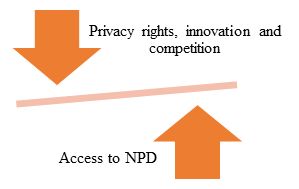In this write-up, we briefly discuss the recent developments in India on non-personal data (NPD) and highlight certain issues concerning NPD.
Committee on non-personal data
In September 2019, the Ministry of Electronics and Information Technology (MeitY) formed a committee of experts led by the co-founder of Infosys – Kris Gopalakrishnan, to come up with a framework to regulate non-personal data (NPD). Media reports suggest that the committee is likely to issue a white paper setting out the contours of non-personal data.

The Personal Data Protection Bill, 2019

The Personal Data Protection Bill, 2019 (PDP Bill) states that the Central Government can direct a data fiduciary or a data processor to provide anonymised personal data or non-personal data "to enable better targeting of delivery of services or formulation of evidence-based policies by Central Government".
The PDP Bill was recently introduced in the Parliament and has been referred to a joint select committee of the Parliament.
The Terms
Non-personal data
- does not identify a person or individual
- carries economic value
- NPD is any data that is not "personal data"?
Personal data
- Defined in the PDP Bill
-
- definition is broad and vague
- "inference drawn from personal data for profiling purposes" would also qualify as personal data
Anonymised data
- PDP Bill exempts anonymised data from obligations under the PDP Bill [exception: sharing anonymized data and NPD with Central Government]
- should anonymised data be regulated as NPD?
Note: There is no mention of pseudonymised data in the PDP Bill.
Regulating NPD
- regulation must have an objective
-
- privacy and competition concerns?
- consumer welfare?
Privacy and competition concerns
- ex ante regulations can adversely affect innovation and growth if based on:
-
- presumption that entry barriers are being/ have been created
- presumption of reduced competitiveness
- presumption against self-correcting nature of markets
- presumption of harm to consumers
- regulation should address actual harm?
Consumer welfare
- NPD sharing needed for public interest reasons (e.g. policy implementation)
-
- legal framework?
- to be balanced with innovation, growth and commercial considerations
-
- commercial actions can increase consumer welfare
Moot Questions
- Should NPD be regulated?
- Should pseudonymised data be treated at par with anonymised data?
- Framework for gaining access to NPD?
-
- regulation;
- voluntary code; or
- contractual arrangement.
- How to treat NPD?
-
- as a copyright?
-
- question of originality to be addressed
- hot news doctrine
- as a trade secret?
- as a database right?
- as a new form of quasi-property right?
- Other considerations?
-
- trade agreements
- restrictive covenants entered into by enterprises
The content of this article is intended to provide a general guide to the subject matter. Specialist advice should be sought about your specific circumstances.


